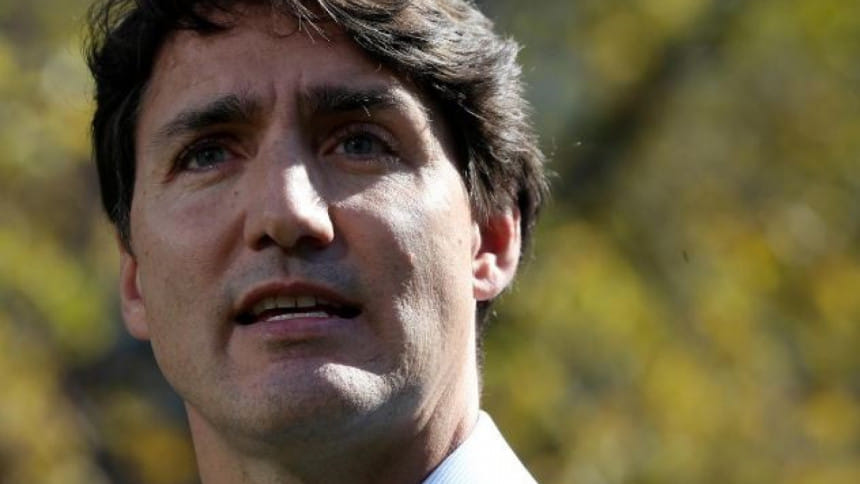Reasons behind Trudeau’s slim victory

A second term in office awaits the incumbent Canadian prime minister, as the centre-left Liberal Party managed to secure enough parliamentary seats to ensure that a minority government, headed by Justin Trudeau, would continue governing the country for a successive term in office. The 2019 Federal Elections in Canada went beyond the traditional debate over Conservatives versus Liberals—rather, it was an extraordinary litmus test for a prime minister whose credibility and popularity simultaneously diminished due to gaping political holes created and aggravated by him, and him only.
The question now remains: can Trudeau reinstate a sense of trust amongst the totality of his electorate? Or will his re-election open the doors to further divisions within the Canadian society, as was seen in the recently concluded elections? Two aspects are crucial when understanding the Canadian elections. First, the weakening of Trudeau's status as the West's torchbearer of progressive politics. Second, how immigrant communities are shaping political decisions in the country.
Prior to the 2015 Federal Elections, Justin Trudeau's team had developed a campaign based on the Liberal leader's individual personality of being the singular progressive alternative to an unpopular Stephen Harper of the Conservative Party. The Liberal slogan of "Ready for Change" resonated with young Canadians and minority groups in particular, as Trudeau's charm brought a fresh sense of vibrancy to politics in the country. What made Trudeau stand out was his image as a magnetic leader providing an alternative to right-wing populist movements around the world.
And he succeeded—he won the elections handsomely, and instituted Canada's first gender-neutral cabinet in office. In his four years in office, Trudeau did well on various fronts especially in investing in innovative jobs and assisting Canada's stable economic growth, resettling refugee claimants to his country and legislating pay equity in the federal sector, amongst others. As such, in the first three years of the Liberal term in office, the prime minister's popularity hovered around 60 percent. Therefore, it is only normal to ask how Trudeau's individual popularity fell to around 30 percent during the 2019 elections. The answer lies in decisions which, unlike his electoral promises, failed to resonate with his electorate.
To put it simply, Trudeau failed to live up to his own standards. At the United Nations and other global conferences, he spoke of the need to tackle climate change collectively. However, his own country is far from pacing itself appropriately in reaching the targets set forth by the Paris Agreement. Additionally, being a so-called climate leader, he announced in 2018 his government's intention to buy the controversial Trans Mountain pipeline from the private company Kinder Morgan, a decision which severely harmed his image as a progressive leader. Trudeau owned this decision politically by suggesting it will guarantee jobs to Albertans, whilst allowing for a practical path to focus on renewable energy in the long run; the proposed development of the pipeline will continue Canada's investment in the oil sector, and as such, the decision severely reduced his voting base amongst younger citizens in 2019.
The expansion of the proposed pipeline in the province of Alberta, and its subsequent operations are slated to forcibly displace many indigenous groups as well—groups which stood by Trudeau in 2015. With the Liberal leader promising reconciliation between the Federal Government and indigenous groups to be a top priority, this decision was seen as a slap on the face of the very people who he owed his rise to in politics. Furthermore, Trudeau was charged by Canada's Ethics Commissioner for pressuring his former Attorney General to not press wholescale charges against SNC Lavalin, a Quebec-based company well known in Bangladesh for its supposed involvement in the Padma Bridge scandal. And of course, in the days leading up to the elections, the bombshell picture of Trudeau appearing in "Blackface" and "Brownface" in his younger years went viral on social media, and Trudeau's image as a towering progressive thinker was further dented. From being the leader that the Canadians wanted, campaigned and sought to vote for, he became one for whom people would still vote, but with the mindset of voting for the lesser of two evils. This change in perception has harmed Trudeau and his party immensely and it remains to be seen how he deals with that in the coming days.
The numbers centring the elections are crucial to understand. The Liberals won a total of 157 seats, dropping their share by 27 from 2015. The Conservatives attained 121 seats, moving up by 22 seats. Immigrant-based communities across the country, amongst which many of the 55,000 to 60,000 Bangladeshi expatriates voted for the first time, leaned strongly towards supporting Trudeau's mandate. This is another important characteristic of the Canadian elections—how Canadians voted across provinces, especially in those with high-density migrant populations such as Ontario as opposed to those with low-density migrant populations such as Alberta. This indicates the increasing divide in the country on the basis of racial and ethnic beliefs. The Bloc Quebecois, a separatist organisation which has traditionally demanded the independence of the province of Quebec from Canada, progressed to official party status this year, by winning 32 out of the 78 seats in Quebec. These numbers show how provinces like Alberta, Saskatchewan and to some extent Quebec have said no to Justin Trudeau. His new government, therefore, has a gigantic task to respond to Canadians who felt alienated by him.
Issues like Trudeau's carbon tax to support green development, or his interest to resettle more migrants in Canada, are controversial across provinces where he earned little to no seats. And addressing their concerns remains his biggest challenge. Yet at the same time, he is in a tough spot—reaching out to them means making concessions on those very values, which he has preached throughout his career. Suffice it to say, pandering to his traditional base of migrants and younger voters may not work in upcoming elections. The rise of the New Democratic Party under Jagmeet Singh, although not visible in the new parliament, is concerning for Trudeau. Therefore, it is safe to say that Justin Trudeau has narrowly survived a calamitous storm during the 2019 elections. He now has the opportunity to take Canada forward in its quest to be a progressive democracy, but the question remains: will we witness Trudeau making a strong comeback politically? Or will he go down in history as the prime minister who could have brought credible change, rather than the prime minister who succeeded in doing so.
For minority groups, his re-election should be seen as a blessing, however. He has been a strong and unflinching ally for immigrants by being a proud promoter of diversity. Like his father Pierre Trudeau, he too sees multiculturalism as the living embodiment of what Canada represents—and this in itself is an achievement for the country. Nevertheless, the support of immigrants cannot and will not be the sole catalyst for a prime minister who needs to reflect and re-engage with the totality of his population in the coming years. And how he does that may well define his destiny and legacy.
Mir Aftabuddin Ahmed graduated in Economics and International Relations from the University of Toronto. Email: [email protected]

 For all latest news, follow The Daily Star's Google News channel.
For all latest news, follow The Daily Star's Google News channel. 



Comments